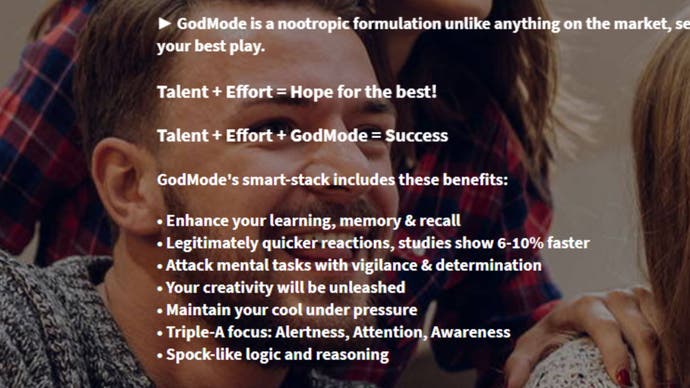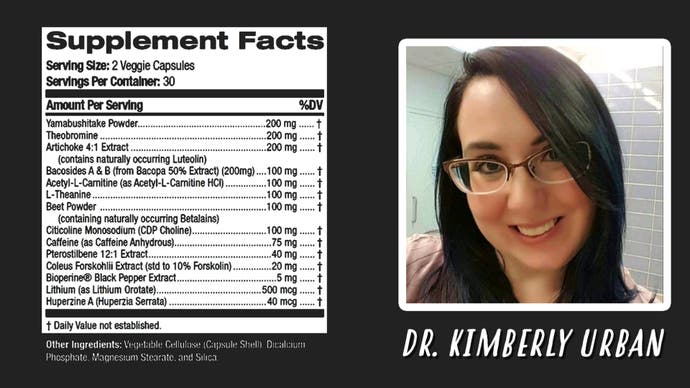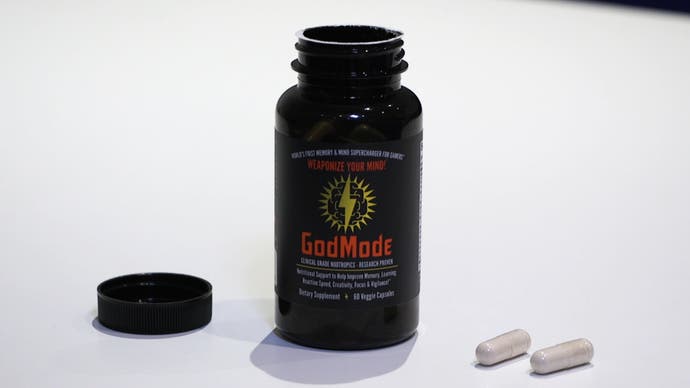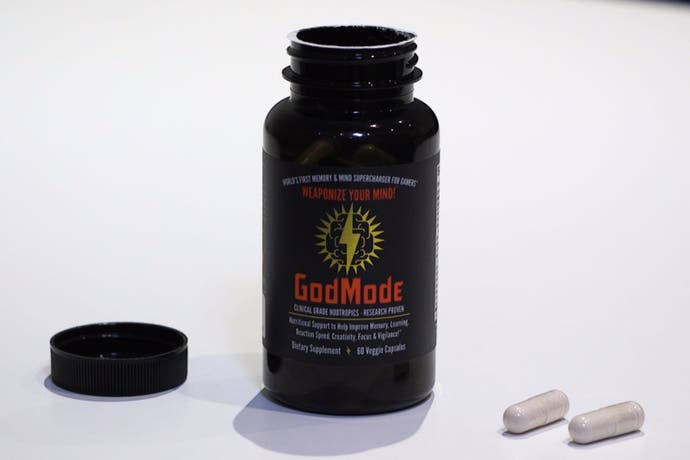The truth about GodMode, the "World's First Brain Booster for Gamers"
Here's A Thing.
A few weeks ago now, a company called Boss Level Labs contacted Eurogamer, claiming to have created the world's first brain booster supplement for gamers. They called it GodMode. Now I felt that claim was a little generous, given I'd heard of an esports team in the States that were sponsored by a similar kind of product, but a couple of things really caught my eye in this email.
First of all, it quoted one of the best chess players of all time, Judit Polgár, a retired grandmaster, who'd said: "I take GodMode to think better and reach victory." On top of that, the CEO of Boss Level Labs is the very same Scott Miller who once co-founded Apogee Software, later known as 3D Realms, the creators of Duke Nukem.
Speaking of the Duke, his voice actor even voices the main advertisement for this product.
I was intrigued. GodMode was very clearly laser-targeted at people who play video games and Boss Level Labs is claiming that if you take it, you'll be better at playing them. So I have two main questions: first of all, what are they selling? And is it legit?
As I started looking at the GodMode website my initial impressions were... skeptical. Here are just some of the things that Boss Level Labs suggest its supplement can do for you:

As I continued to scroll down the main page, I found the list of ingredients and once again, in bold red text, there are some huge claims being made. Boosts cognition! Improves memory! Amps up alertness! Reduces depression! Decreases anxiety! Elevates mood! Long-term benefits to your brain health!
It all sounds incredible, doesn't it? And let's be frank, completely unbelievable. However, I'm aware that I'm making that judgement mostly because the website looks a bit dodgy. Perhaps that's an unfair stance to take. So, with that in mind, let's talk to a professional.
Dr. Kimberly Urban is a neuroscientist based in Philadelphia and she seemed the perfect person to ask about GodMode, given she'd written her PhD on the neural ramifications of nootropic drugs. If you haven't heard the word 'nootropic' before, it refers to any substance that has the ability to improve cognitive function and it's become something of a buzzword for companies like Boss Level Labs. In fact, on the GodMode homepage alone, it's featured 29 times.
So what does a nootropics expert make of this stuff?

"Well what jumped out at me," said Dr. Urban, "was the fact that it contains caffeine, it also contains theobromine which is another stimulant. It is going to provide a sensation of enhanced alertness and focus, but that's just from the caffeine. You'd get the same thing from drinking a couple of cups of coffee."
But hang on, what about the other claims that Boss Level Labs is making? Surely you can't say that your product is going to think like Elon Musk and it'll unleash their creativity, if you can't also prove that'll it can do those things. Well, actually, it turns out you can.
Over-the-counter supplements exist in a very unusual place within the medical world. In the United States, for example, your advertising doesn't need to be regulated by the Food and Drug Administration. Which means that yes, you can claim to have 847 clinical studies backing up the ingredients in your product, as Boss Level Labs does, but there's no need for those studies to be checked by an unbiased, third party organization.
I requested a month's supply of GodMode to try for myself and just before I started taking it myself, I thought I'd quickly check if this stuff is actually safe to take.
"I didn't see anything in there that I would deem dangerous," confirmed Dr. Urban, "and the amount of caffeine is not even a high amount of caffeine. I probably consume three times that amount of caffeine on a daily basis myself. But yeah, I don't think there's anything dangerous in it."
The GodMode arrived at the office last month and I began taking the recommended two capsules each morning. As expected, the advertising on the bottle was accompanied by a small asterisk, pointing out that: "These statements have not been evaluated by the Food and Drug Administration. This product is not intended to diagnose, treat, cure or prevent any disease."
Now there were two major issues when it came to measuring what kind of effect GodMode was having on me. First up, and this is a big one, there's no way to account for the placebo response. What happens if my own personal expectations of the supplement end up impacting the results themselves? A true clinical trial would test the effects on a much larger group, with some of those people taking a dummy version of the supplement. Then, if both groups respond in a similar fashion, you'd be able to conclude that it might not be the supplement that's causing those effects.
Also, if we want to talk about the impact GodMode is having on my performance while playing games... that's a pretty difficult thing to measure. Say I was to play Tetris every single day over the course of my trial and then track my scores. Well, I'll just end up getting better at Tetris. That's not necessarily a response to the supplement.

Instead, I spent two weeks prior to taking GodMode completing a series of brain tests which scored my reasoning, memory and concentration. My results during these two weeks remained fairly consistent, which didn't do much for my ego, but did suggest that if I then went on to do the same tests while taking the supplement, I could compare the average scores and see what kind of difference it might have made.
But yeah, even then, that's a bad experiment. I could still be getting better at the tests over time and the data just hasn't reflected that yet. And we're doing nothing to account for the placebo response. So when we do look at the results, we're going to have to take them with a huge grain of salt.
Which means if my testing isn't going to be enough to draw a full conclusion, I want to talk to someone that's taken it for a lot longer than I have. Someone that believes it has, in fact, made a genuine difference to their lives. Fortunately Boss Level Labs advertises a list of what it calls its 'Pro Users', including Grandmaster Judit Polgár, but also a gameplay designer who'd worked on Gears of War, the co-founder of Remedy Entertainment, the co-founder of Ready at Dawn and a long list of other industry names from the gaming, fitness and literary worlds.
Starting with Ms Polgár, I began contacting each of the Pro Users, requesting an interview about their experience with the supplement. She declined the interview, as did one other person on the list. There were a handful of users I just couldn't get in touch with, but others stopped replying once GodMode had been mentioned. Two of the Pro Users told me they hadn't taken the supplement at all, with one of those users going on to request he be removed from the site. Another explained that although he was passionate about the project because he'd known Boss Level Labs CEO, Scott Miller for years, he wasn't sure he'd noticed any effect from taking GodMode for three months.
In fact, out of the 18 Pro Users, I was only able to speak to one of them who believed it had improved her day-to-day life.
"Before GodMode, I thought I was losing my mind," explained literary agent Tricia Skinner, "I was forgetting absolutely everything. I also found myself feeling like I was dragging myself through the day. It was so bad that I went to the doctor. They did a buttload of tests and as far as pills, they wanted to give me all sorts of medication that I did not want to take.
"The timing of this was just perfect because Scott Miller reached out and he was telling me that, yeah, I've been doin nootropics forever and I've formed this company and we have this product. I started taking it and the immediate effects that I have experienced: I don't take naps anymore, my energy level has just had this subtle, natural improvement."
But what about the placebo response? Isn't there a real possibility this could be playing a role here?
"I hear what you're saying," said Skinner. "I don't think I had one. I think I'm just one of the lucky ones that went into this and said, you know what? I hope it works."
So how about my own experience? Have I been one of the lucky ones, like Ms Skinner? Well, no I don't think I was. I took two capsules everyday for two weeks and as advised on the bottle, I cut out any additional sources of caffeine. Which sucked, by the way.
I usually took the capsules in the morning and started to feel their effects quite quickly. There was an effect. I felt more alert, less groggy and occasionally a little lightheaded for half an hour or so. Which, as Dr. Urban had predicted, felt quite similar to drinking a couple of cups of strong coffee in quick succession. It didn't feel especially obvious to me that anything more complex than that was happening.
As for my results, I completed two sets of those brain tests each day at around the same time and compared them with the results from the two weeks while not taking GodMode. I found that for two of those three tests, those measuring reasoning and memory, my average had dropped marginally while on the supplement. Whereas the test for concentrations shows a small increase. You can see the full table of those results in the accompanying video.
However, as we've already determined, I've no way of knowing if any of these scores have been affected (positively or negatively) by a placebo response. Which got me thinking about the 847 clinical studies referenced on the GodMode site. Perhaps they could offer me some more definitive results?
There aren't actually 847 studies cited on the site itself, there are in fact just a handful under each of the listed ingredients. But let's take a look at one of those. Yamabushitake, for example, is meant to reduce depression and anxiety. Let's see if the research backs that up.
The first citation points to the International Journal of Biological Macromolecules, Volume 97, Pages 228-237. After a little digging, I found a copy.
It concludes that Yamabushitake has been used to "treat epigastric pain caused by chronic superficial gastritis", but any further studies about its effect on memory and learning "still need to vigorously increase". The study itself says this ingredient needs more studies!
Yamabushitake is great if you're struggling with gastritis, sure, but if that's not what you're selling, I don't know why you'd cite that study?
Is that what this claim regarding depression and anxiety is based on? Because if so, that feels very irresponsible. I think I need to pose that question, along with a few others to the one person that can answer them: Scott Miller, the CEO of Boss Level Labs.

"If you read the books that doctors have to read," said Miller, "they are so anti-supplement, because they're funded by the pharmaceutical industry. And the pharmaceutical industry tells you things like avoid fish oil, avoid all this stuff. They don't want you doctors to believe in any of that stuff. I hate to say it, but doctors are brainwashed from day one when they enter medical school that drugs work and anything outside of drugs isn't going to work."
But what about the false claims being made on his own site? Does Yamabushitake actually reduce depression and anxiety, in his opinion?
"It could have. I wouldn't recommend it strictly for that and that's not why we use it in GodMode. It has other benefits is why we use it. For depression I would definitely recommend other things like Vitamin D3 and there are a few other things that would probably have a way better impact."
I then asked if he was worried about this claim misleading people who do struggle with either of those conditions. People that could come to his site and see that sentence in bold, red text and see a solution that doesn't exist.
"Let me see how that look on the site here," said Miller. "I'm pretty sure that it does help in that area."
There were a few moment of silence.
"I've found one study," continued Miller, "that says there was a reduction of depression and anxiety over four weeks..."
I was fairly sure I'd seen that study too and asked him if it referred to a small test on a group of overweight Japanese women who had been given the Yamabushitake after it had been pressed into cookies.
"I don't see anything about, oh, 30 females were randomly selected," said Miller before trailing off.
"I don't want to do this over the phone, I'd have to look around." said Miller. "That part should definitely probably not be in that red section because that's not a primary benefit that we're trying to push anyway. There's actually a lot of stuff on this page that I want to redo and we have a web designer right now working on a whole different version of this website. All of our redos are going into that and we're hoping that happens very quickly, so we can dump this current page which is not very good in my opinion.
"Our main pursuit right now is to get the website redone, to get the messaging better. In fact, on our new website we're going to reduce, significantly, the push towards just the game market."
Following that interview, Boss Level Labs has now removed the claim that GodMode reduces depression and anxiety.
There is no longer any mention of Grandmaster Judit Polgár on the site.
And the Pro User that requested he be removed from the site, has been.










